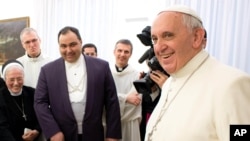Pope Francis has called on the world's business and political elite to use their skills and immense resources to alleviate global poverty.
The pontiff's message Tuesday opened the annual World Economic Forum in Davos, Switzerland. In it, the pope praised the fundamental role that modern business has played in improving health care, education and communications. But he also said it is "intolerable" that hunger continues to grip many struggling economies. He urged forum delegates to "ensure that humanity is served by wealth and not ruled by it."
The papal plea came as the human rights group Oxfam released a study showing the wealth of the world's 85 richest individuals equals that of 3.5 billion people - a full one-half of the global population.
A co-author of the report, Nick Galasso, tells VOA that wealthy elites have used their political power to get lower tax rates, hide wealth offshore, and otherwise serve their own interests.
"High levels of inequality actually corrode democratic processes. What we have seen across the globe and what the report documents is how wealth concentration is used to influence the political process to create laws and regulations that benefit the rich over everyone else," said Galasso.
Oxfam said that "by some measure, the riches of billionaires are now unparalleled in history." Last year, Forbes magazine calculated the combined fortunes of the 85 wealthiest at nearly $1.7 trillion.
The report did not name the world's 85 richest individuals, but cited lists compiled by Credit Suisse bank and Forbes. It said the income alone derived from the $73 billion fortune of the world's richest individual, Mexican telecommunications mogul Carlos Slim, could pay the yearly wages of 440,000 Mexicans.
The report lists financial deregulation, tax havens and secrecy, and diminished public services as examples of political maneuvering by the wealthy. It said the effect of these policy changes is not only to concentrate wealth and political influence in higher income brackets, but to ensure it stays there for the next generation.
Oxfam says that in the past decade, the number of billionaires in India has increased tenfold, while in Europe, austerity measures mainly affect the middle and lower classes. It says in Africa, global corporations exploit their political influence to avoid taxes, reducing government resources to fight poverty.
Oxfam is calling for those business leaders and government delegates at the forum to support government programs that strive to help under-served middle and lower income levels, support development of fair wages and crack down on tax dodging and financial secrecy.
The pontiff's message Tuesday opened the annual World Economic Forum in Davos, Switzerland. In it, the pope praised the fundamental role that modern business has played in improving health care, education and communications. But he also said it is "intolerable" that hunger continues to grip many struggling economies. He urged forum delegates to "ensure that humanity is served by wealth and not ruled by it."
The papal plea came as the human rights group Oxfam released a study showing the wealth of the world's 85 richest individuals equals that of 3.5 billion people - a full one-half of the global population.
A co-author of the report, Nick Galasso, tells VOA that wealthy elites have used their political power to get lower tax rates, hide wealth offshore, and otherwise serve their own interests.
"High levels of inequality actually corrode democratic processes. What we have seen across the globe and what the report documents is how wealth concentration is used to influence the political process to create laws and regulations that benefit the rich over everyone else," said Galasso.
Oxfam said that "by some measure, the riches of billionaires are now unparalleled in history." Last year, Forbes magazine calculated the combined fortunes of the 85 wealthiest at nearly $1.7 trillion.
The report did not name the world's 85 richest individuals, but cited lists compiled by Credit Suisse bank and Forbes. It said the income alone derived from the $73 billion fortune of the world's richest individual, Mexican telecommunications mogul Carlos Slim, could pay the yearly wages of 440,000 Mexicans.
The report lists financial deregulation, tax havens and secrecy, and diminished public services as examples of political maneuvering by the wealthy. It said the effect of these policy changes is not only to concentrate wealth and political influence in higher income brackets, but to ensure it stays there for the next generation.
Oxfam says that in the past decade, the number of billionaires in India has increased tenfold, while in Europe, austerity measures mainly affect the middle and lower classes. It says in Africa, global corporations exploit their political influence to avoid taxes, reducing government resources to fight poverty.
Oxfam is calling for those business leaders and government delegates at the forum to support government programs that strive to help under-served middle and lower income levels, support development of fair wages and crack down on tax dodging and financial secrecy.





